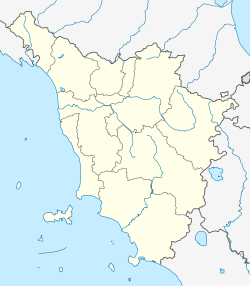Firenze Campo di Marte | |||||||||||
|---|---|---|---|---|---|---|---|---|---|---|---|
 View of the platforms. | |||||||||||
| General information | |||||||||||
| Location | Via Mannelli 12 50132 Firenze Italy | ||||||||||
| Coordinates | 43°46′39″N11°16′35″E / 43.77750°N 11.27639°E | ||||||||||
| Owned by | Rete Ferroviaria Italiana | ||||||||||
| Operated by | Rete Ferroviaria Italiana | ||||||||||
| Line(s) | Florence–Rome Florence–Faenza | ||||||||||
| Distance | 310.112 km (192.695 mi) from Roma Termini | ||||||||||
| Platforms | 9 | ||||||||||
| Other information | |||||||||||
| IATA code | FIR | ||||||||||
| Services | |||||||||||
| |||||||||||
| |||||||||||
Firenze Campo di Marte (or, simply, Firenze Campo Marte) ( IATA : FIR) is the third railway station of Florence and the eighth station of Tuscany and the biggest station in south Florence. [1] The station is mostly used by commuters going to Florence coming from the nearby countryside

